Power Apps – 12 Days of Components
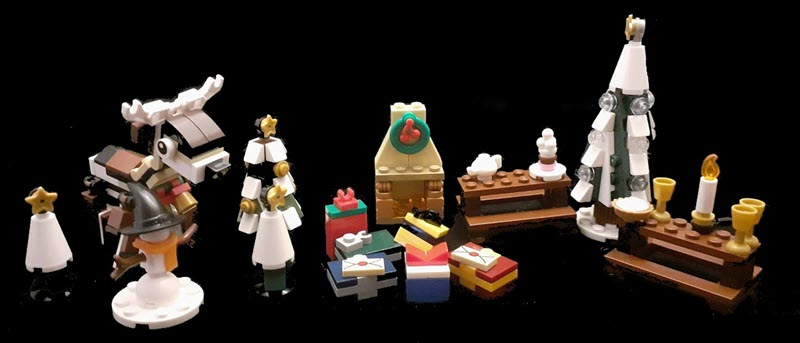
Madly I decided I was going to do 12 videos on Power App components and they have had a heavy focus using SVG. This post is to provide the code and resources for each video.
Day 1 – Create a Component
Video walks through turning on components, adding an SVG image and then adding the component to a screen within the app.
SVG Code
"data:image/svg+xml;utf8, " & EncodeUrl(
"<svg xmlns='http://www.w3.org/2000/svg' viewBox='0 0 100 100'>
<path d='M0 100 L100 100 L50 50 Z M10 75 L90 75 L50 35 Z M20 50 L80 50 L50 15 Z' fill='#008A00' />
<g fill='#EA0000'>
<circle cx='55' cy='40' r='5'/>
<circle cx='40' cy='60' r='5'/>
<circle cx='60' cy='80' r='5'/>
<circle cx='30' cy='90' r='5'/>
</g>
<g fill='#FFFF00'>
<path d='M50 0 L40 15 L60 15 Z'/>
<path d='M40 5 L60 5 L50 20 Z' />
</g>
</svg>"
)Day 2 – Add an Input
This video adds an input, called BaubleColour which is a HEX string, to the Christmas tree component to allow the component user to select a colour for the baubles.
SVG Code
"data:image/svg+xml;utf8, " & EncodeUrl(
"<svg xmlns='http://www.w3.org/2000/svg' viewBox='0 0 100 100'>
<path d='M0 100 L100 100 L50 50 Z M10 75 L90 75 L50 35 Z M20 50 L80 50 L50 15 Z' fill='#008A00' />
<g fill='" & Parent.BaubleColour & "'>
<circle cx='55' cy='40' r='5'/>
<circle cx='40' cy='60' r='5'/>
<circle cx='60' cy='80' r='5'/>
<circle cx='30' cy='90' r='5'/>
</g>
<g fill='#FFFF00'>
<path d='M50 0 L40 15 L60 15 Z'/>
<path d='M40 5 L60 5 L50 20 Z' />
</g>
</svg>"
)Day 3 – Use Table Input
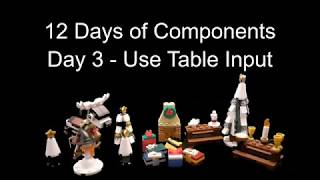
This video uses a table of HEX strings called BaubleColours to provide a list of colours for the baubles. The colours are cycled through using a timer control.
SVG Code
"data:image/svg+xml;utf8, " & EncodeUrl(
"<svg xmlns='http://www.w3.org/2000/svg' viewBox='0 0 100 100'>
<path d='M0 100 L100 100 L50 50 Z M10 75 L90 75 L50 35 Z M20 50 L80 50 L50 15 Z' fill='#008A00' />
<g fill='" & Last(FirstN(Parent.BaubleColours,vvBaubleColourNumber)).BColour & "'>
<circle cx='55' cy='40' r='5'/>
<circle cx='40' cy='60' r='5'/>
<circle cx='60' cy='80' r='5'/>
<circle cx='30' cy='90' r='5'/>
</g>
<g fill='#FFFF00'>
<path d='M50 0 L40 15 L60 15 Z'/>
<path d='M40 5 L60 5 L50 20 Z' />
</g>
</svg>"
)Day 4 – Use SVG Transform
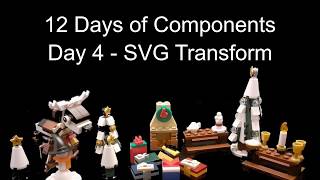
This video does a simple transform in SVG to make the star on the top of the tree rotate.
SVG Code
"data:image/svg+xml;utf8, " & EncodeUrl(
"<svg xmlns='http://www.w3.org/2000/svg' viewBox='0 0 100 100'>
<path d='M0 100 L100 100 L50 50 Z M10 75 L90 75 L50 35 Z M20 50 L80 50 L50 15 Z' fill='#008A00' />
<g fill='" & Last(FirstN(Parent.BaubleColours,vvBaubleColourNumber)).BColour & "'>
<circle cx='55' cy='40' r='5'/>
<circle cx='40' cy='60' r='5'/>
<circle cx='60' cy='80' r='5'/>
<circle cx='30' cy='90' r='5'/>
</g>
<g fill='#D4AF37'>
<path d='M50 0 L40 15 L60 15 Z'/>
<path d='M40 5 L60 5 L50 20 Z' />
<animateTransform attributeName='transform'
attributeType='XML'
type='rotate'
from='0 50 10'
to='360 50 10'
dur='10s'
repeatCount='indefinite'/>
</g>
</svg>"
)Day 5 – Flexible Resizing of SVG
Using percentage values within the SVG make the image flexible when the component is resized.
SVG Code
"data:image/svg+xml;utf8, " & EncodeUrl(
"<svg xmlns='http://www.w3.org/2000/svg'>
<rect x='0' y='0' width='100%' height='100%' fill='blue'/>
<g fill='red'>
<rect x='45%' y='0' width='10%' height='100%'/>
<rect x='0' y='45%' width='100%' height='10%'/>
</g>
</svg>"
)Day 6 – Patterned Presents
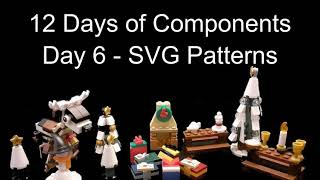
Using SVG patterns and a list of patterns we can add patterns to the present wrappings.
"data:image/svg+xml;utf8, " & EncodeUrl(
"<svg xmlns='http://www.w3.org/2000/svg'>
<defs>
<pattern id='paper' viewBox='0,0,10,10' width='10%' height='10%'>
" & LookUp(Parent.Patterns,PatternName=Parent.PatternName,Pattern) & "
</pattern>
</defs>
<rect x='0' y='0' width='100%' height='100%' fill='url(#paper)'/>
<g fill='red'>
<rect x='45%' y='0' width='10%' height='100%'/>
<rect x='0' y='45%' width='100%' height='10%'/>
</g>
</svg>"
)Day 7 – Add a Tag using SVG Text and Rotate
Using SVG Text and rotate we can create another component to draw a tag that uses an input of the name to label each present.
"data:image/svg+xml;utf8, " & EncodeUrl(
"<svg xmlns='http://www.w3.org/2000/svg' viewBox='0 0 100 100'>
<path d='M0 0 L33 0 L100 67 L67 100 L0 33 Z' fill='tan' />
<text x='10' y='60' font-size='30' transform='rotate(45,50,50)'>" & Parent.TagName & "</text>
</svg>"
)Day 8 – Star Rating
Rate your New Year Resolution progress with a star rating drawn with a little SVG and a gallery.
With(
{StarColour:If(
ThisItem.Value<='Day08 Star Rating'.Score,
"Gold",
"LightGrey"
)
},
"data:image/svg+xml;utf8, " & EncodeUrl(
"<svg xmlns='http://www.w3.org/2000/svg' viewBox='0 0 100 100'>
<path fill='" & StarColour & "' d='m50,2 12,34h36l-28,22 10,34-30-20-30,20 10-34-28-22h36z'/>
</svg>"
)
)Day 9 – Fill a shape using SVG Clip
Fill up a heart in colour to visualise a percentage value using a component containing SVG using a clip path.
SVG Code
With(
{
SVG: "<path d='m50,25 c20,-58 100,0 0,75 c-100,-75 -20,-132 0,-75z' />",
ClipWidth: 100 * Parent.Score
},
"data:image/svg+xml;utf8, " & EncodeUrl(
"<svg xmlns='http://www.w3.org/2000/svg' viewBox='0 0 100 100'>
<defs><clipPath id='HeartClip'>
<rect x='0' y='0' height='100' width='" & ClipWidth & "' />
</clipPath></defs>
<g fill='LightGrey'>" & SVG & "</g>
<g fill='Red' clip-path='url(#HeartClip)'>" & SVG & "</g>
<text x='50' y='50' text-anchor='middle' fill='white' font-size='25'>" & ClipWidth & "%</text>
</svg>"
)
)SVG Code to fill from the bottom up
With(
{
SVG: "<path d='m50,25 c20,-58 100,0 0,75 c-100,-75 -20,-132 0,-75z' />",
ClipHeight: 100 * Parent.Score,
ClipY: 100 - 100 * Parent.Score
},
"data:image/svg+xml;utf8, " & EncodeUrl(
"<svg xmlns='http://www.w3.org/2000/svg' viewBox='0 0 100 100'>
<defs><clipPath id='HeartClip'>
<rect x='0' y='" & ClipY & "' height='100' width='100' />
</clipPath></defs>
<g fill='LightGrey'>" & SVG & "</g>
<g fill='Red' clip-path='url(#HeartClip)'>" & SVG & "</g>
<text x='50' y='50' text-anchor='middle' fill='white' font-size='25'>" & ClipHeight & "%</text>
</svg>"
)
)Day 10 – Fill Part stars using SVG Clip
Combining the star rating from Day 9 with the clip path from Day 10 we can improve the star rating to show part stars for a score of 2.5 etc.
SVG Code
With(
{
StarSVG: "<path d='m50,2 12,34h36l-28,22 10,34-30-20-30,20 10-34-28-22h36z'/>",
ClipWidth: 100 * ('Day10 Star Rating Improved'.Score - ThisItem.Value + 1)
},
"data:image/svg+xml;utf8, " & EncodeUrl(
"<svg xmlns='http://www.w3.org/2000/svg' viewBox='0 0 100 100'>
<defs><clipPath id='StarClip'>
<rect x='0' y='0' height='100' width='" & ClipWidth & "' />
</clipPath></defs>
<g fill='LightGrey'>" & StarSVG & "</g>
<g fill='Gold' clip-path='url(#StarClip)'>" & StarSVG & "</g>
</svg>"
)
)Day 11 – Draw a Gauge
Draw a simple gauge to show a percentage value using an arch and rotating a line with a simple transform.
SVG Code
With(
{
SVGArch: "<path d='M 0 50 A 50 50 0 0 1 100 50 L80 50 A 30 30 0 0 0 20 50' /> ",
SVGRotate: 180 * Parent.Score
},
"data:image/svg+xml;utf8, " & EncodeUrl(
"<svg xmlns='http://www.w3.org/2000/svg' viewBox='0 0 100 50'>
<g fill='LightBlue'>" & SVGArch & "</g>
<line x1='0' y1='50' x2='20' y2='50' stroke-width='1' stroke='black'
transform='rotate(" & SVGRotate & " 50 50)' />
</svg>"
)
)Day 12 – Add Colours to that Gauge
Lets add some colour to the gauge from day 11 of this series. We look at rotate again and how moving items partly outside the view box hides that part.
SVG Code
With(
{
SVGArch: "<path d='M 0 50 A 50 50 0 0 1 100 50 L80 50 A 30 30 0 0 0 20 50' /> ",
SVGRotate: 180 * Parent.Score,
RedRotate: -180 * (1 - Parent.RedScore),
AmberRotate: -180 * (1 - Parent.AmberScore)
},
"data:image/svg+xml;utf8, " & EncodeUrl(
"<svg xmlns='http://www.w3.org/2000/svg' viewBox='0 0 100 50'>
<g fill='Green'>" & SVGArch & "</g>
<g fill='Gold' transform='rotate(" & AmberRotate & " 50 50)' >" & SVGArch & "</g>
<g fill='Red' transform='rotate(" & RedRotate & " 50 50)'>" & SVGArch & "</g>
<line x1='0' y1='50' x2='20' y2='50' stroke-width='1' stroke='black'
transform='rotate(" & SVGRotate & " 50 50)' />
</svg>"
)
)Conclusion
I thoroughly enjoyed building the different components and working out the SVG code to use. I hope you have enjoyed watching. Below is the link to download a zip of the MSApp file for the components.
https://hatfullofdata.blog/wp-content/uploads/2020/01/12-Days-of-Components.zip
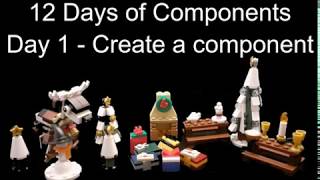
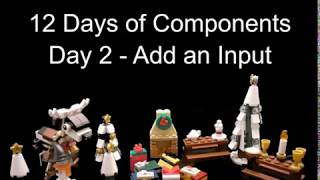
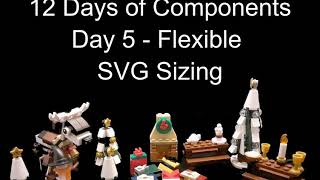

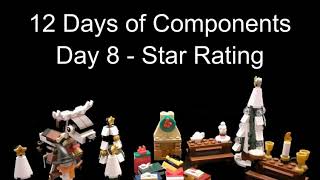
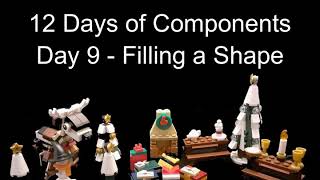
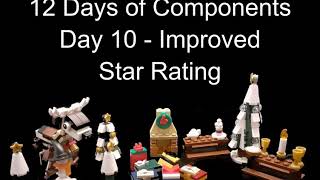
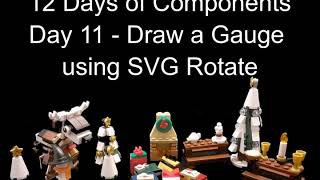
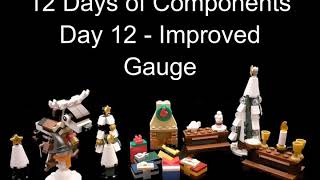
I’ve only watched 4 so far and I have learned more about how to use components than any of the Microsoft tutorials. Thank you for sharing this.
Really glad you enjoyed the videos. Let me know what you create.